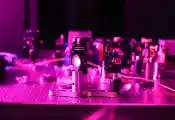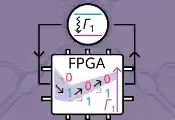NSF Awards UNM-Led Team $4M to Design Photonic Quantum Computer
September 08, 2025 -- A quantum research project led by The University of New Mexico in collaboration with national labs and universities around the country was awarded a $4 million grant from the National Science Foundation (NSF) under the National Quantum Virtual Laboratory (NQVL) program to continue research into the design and future development of a photonic quantum computer.
The development of such a computer could one day allow for large-scale manufacturing of more reliable technology with exponentially greater processing power. Quantum computing could unlock the ability to solve complex problems that even the world’s most advanced computers currently struggle with, and in a much shorter amount of time.
The UNM-led research team is one of four selected nationally to enter the design phase of the NQVL program, an effort to accelerate the development of quantum technology in the U.S.
Spearheaded by UNM Distinguished Professor of Electrical and Computer Engineering Marek Osinski, the project titled “Quantum Computing Applications of Photonics” began its pilot year in August 2024 and aims to develop a photonic quantum computer that can operate at room temperature. In stage one, the team received $1 million to begin development of key project components.
Project collaborators are:
- New Mexico State University
- University of Virginia
- University of Maryland
- Sandia National Laboratories
- Los Alamos National Laboratory
- National Institute of Standards and Technology
The new funding highlights rapidly expanding efforts to enhance quantum technology research and development in New Mexico with strong supporting interest from both the public and private sectors.
“I’m thrilled that UNM, Los Alamos and Sandia National Labs have been selected by the U.S. National Science Foundation to lead the design of a photonic quantum computer,” said U.S. Sen. Martin Heinrich (D-N.M.). “This investment underscores New Mexico’s leadership in science and innovation, and it will help strengthen and grow our world-class workforce right here at home. By bringing together our students, researchers, and labs on the cutting edge of quantum technology, we are solidifying New Mexico’s leadership in driving the future of discovery and opportunity.”
The grant awarded to UNM is part of NSF’s $16 million investment in the NQVL initiative. With the new funding, the UNM-led research team is now one step closer to bringing to fruition a fully programmable photonic quantum computer integrated into a single chip.
Most quantum computers can only operate at extremely low, sub-zero temperatures, but the use of Gaussian boson sampling and photonics implementation could help researchers develop a computer with quantum power that is operational at room temperature. Gaussian boson sampling computers have been developed before, but have more closely resembled optical tables found in laboratories than the devices most people regard as computers. The team aims to develop the technology as a fully integrated chip.
“Quantum Information Science and Engineering promises to accelerate information processing far beyond classical limits, enabled by the differences in the foundational natural laws of classical and quantum physics,” Osinski said. “The NSF NQVL Quantum Computing Applications of Photonics (QCAP) project is dedicated to developing integrated hardware and software solutions that overcome current limitations in scalability and reliability. It provides a comprehensive technical approach to overcoming the intrinsic challenges of current quantum photonic devices.”




































